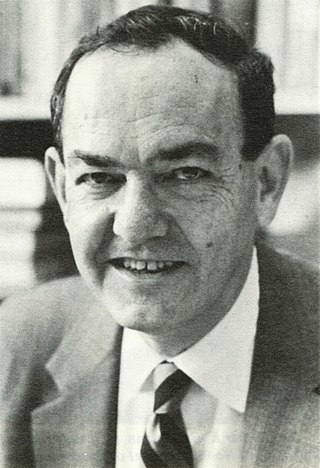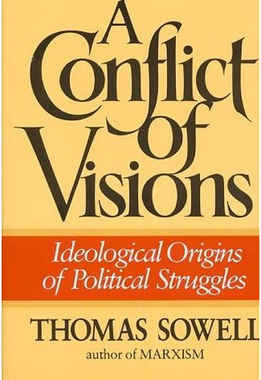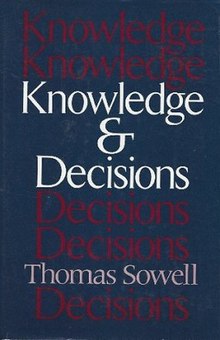
The Austrian school is a heterodox school of economic thought that advocates strict adherence to methodological individualism, the concept that social phenomena result primarily from the motivations and actions of individuals along with their self interest. Austrian-school theorists hold that economic theory should be exclusively derived from basic principles of human action.
The economic calculation problem (ECP) is a criticism of using central economic planning as a substitute for market-based allocation of the factors of production. It was first proposed by Ludwig von Mises in his 1920 article "Economic Calculation in the Socialist Commonwealth" and later expanded upon by Friedrich Hayek.

Friedrich August von Hayek, often referred to by his initials F. A. Hayek, was an Austrian-British academic who contributed to economics, political philosophy, psychology, and intellectual history. Hayek shared the 1974 Nobel Memorial Prize in Economic Sciences with Gunnar Myrdal for work on money and economic fluctuations, and the interdependence of economic, social and institutional phenomena. His account of how prices communicate information is widely regarded as an important contribution to economics that led to him receiving the prize.

Herbert Alexander Simon was an American political scientist whose work also influenced the fields of computer science, economics, and cognitive psychology. His primary research interest was decision-making within organizations and he is best known for the theories of "bounded rationality" and "satisficing". He received the Turing Award in 1975 and the Nobel Memorial Prize in Economic Sciences in 1978. His research was noted for its interdisciplinary nature, spanning the fields of cognitive science, computer science, public administration, management, and political science. He was at Carnegie Mellon University for most of his career, from 1949 to 2001, where he helped found the Carnegie Mellon School of Computer Science, one of the first such departments in the world.

Rational choice theory refers to a set of guidelines that help understand economic and social behaviour. The theory originated in the eighteenth century and can be traced back to the political economist and philosopher Adam Smith. The theory postulates that an individual will perform a cost–benefit analysis to determine whether an option is right for them. Rational choice theory looks at three concepts: rational actors, self interest and the invisible hand.

Public choice, or public choice theory, is "the use of economic tools to deal with traditional problems of political science." It includes the study of political behavior. In political science, it is the subset of positive political theory that studies self-interested agents and their interactions, which can be represented in a number of ways—using standard constrained utility maximization, game theory, or decision theory. It is the origin and intellectual foundation of contemporary work in political economy.

Thomas Sowell is an American economist, social philosopher, and political commentator. He is a senior fellow at the Hoover Institution. With widely published commentary and books—and as a guest on TV and radio—he is a well-known voice in the American conservative movement as a prominent black conservative. He was a recipient of the National Humanities Medal from President George W. Bush in 2002.
Dispersed knowledge in economics is the notion that no single agent has information as to all of the factors which influence prices and production throughout the system. The term has been both expanded upon and popularized by American economist Thomas Sowell.
The Chicago school of economics is a neoclassical school of economic thought associated with the work of the faculty at the University of Chicago, some of whom have constructed and popularized its principles. Milton Friedman and George Stigler are considered the leading scholars of the Chicago school.

A Conflict of Visions is a book by Thomas Sowell. It was originally published in 1987; a revised edition appeared in 2007. Sowell's opening chapter attempts to answer the question of why the same people tend to be political adversaries in issue after issue, when the issues vary enormously in subject matter and sometimes hardly seem connected to one another. The root of these conflicts, Sowell claims, are the "visions", or the intuitive feelings that people have about human nature; different visions imply radically different consequences for how they think about everything from war to justice.

The Road to Serfdom is a book by the Austrian-British economist and philosopher Friedrich Hayek. In the book, Hayek "[warns] of the danger of tyranny that inevitably results from government control of economic decision-making through central planning." He further argues that the abandonment of individualism and classical liberalism inevitably leads to a loss of freedom, the creation of an oppressive society, the tyranny of a dictator, and the serfdom of the individual. Hayek challenged the view, popular among British Marxists, that fascism was a capitalist reaction against socialism. He argued that fascism, Nazism, and state-socialism had common roots in central economic planning and empowering the state over the individual.

Criticism of socialism is any critique of socialist economics and socialist models of organization and their feasibility, as well as the political and social implications of adopting such a system. Some critiques are not necessarily directed toward socialism as a system but rather toward the socialist movement, parties, or existing states. Some critics consider socialism to be a purely theoretical concept that should be criticized on theoretical grounds, such as in the economic calculation problem and the socialist calculation debate, while others hold that certain historical examples exist and that they can be criticized on practical grounds. Because there are many types of socialism, most critiques are focused on a specific type of socialism, that of the command economy and the experience of Soviet-type economies that may not apply to all forms of socialism as different models of socialism conflict with each other over questions of property ownership, economic coordination and how socialism is to be achieved. Critics of specific models of socialism might be advocates of a different type of socialism.
The Austrian business cycle theory (ABCT) is an economic theory developed by the Austrian School of economics seeking to explain how business cycles occur. The theory views business cycles as the consequence of excessive growth in bank credit due to artificially low interest rates set by a central bank or fractional reserve banks. The Austrian business cycle theory originated in the work of Austrian School economists Ludwig von Mises and Friedrich Hayek. Hayek won the Nobel Prize in Economics in 1974 in part for his work on this theory.

Criticism of Marxism has come from various political ideologies, campaigns and academic disciplines. This includes general intellectual criticism about dogmatism, a lack of internal consistency, criticism related to materialism, arguments that Marxism is a type of historical determinism or that it necessitates a suppression of individual rights, issues with the implementation of communism and economic issues such as the distortion or absence of price signals and reduced incentives. In addition, empirical and epistemological problems are frequently identified.

The Constitution of Liberty is a book written by Friedrich Hayek, first published in 1960 by the University of Chicago Press. Many scholars have considered The Constitution of Liberty as the most important work by Hayek.

"The Use of Knowledge in Society" is a scholarly article written by Austrian-British academic economist Friedrich Hayek, first published in the September 1945 issue of The American Economic Review.

Intellectuals and Society is a non-fiction book by Thomas Sowell. The book was initially published on January 5, 2010, by Basic Books.
The opposition between substantivist and formalist economic models was first proposed by Karl Polanyi in his work The Great Transformation (1944).

Masters of the Universe: Hayek, Friedman, and the Birth of Neoliberal Politics is a 2012 book by barrister Daniel Stedman Jones, in which the author traces the intellectual development and political rise of neoliberalism in the United States and the United Kingdom. Originally a PhD thesis, the author adapted it into a book.

Basic Economics is a non-fiction book by American economist Thomas Sowell published by Basic Books in 2000. The original subtitle was A Citizen's Guide to the Economy, but from the third edition in 2007 on it was subtitled A Common Sense Guide to the Economy.












